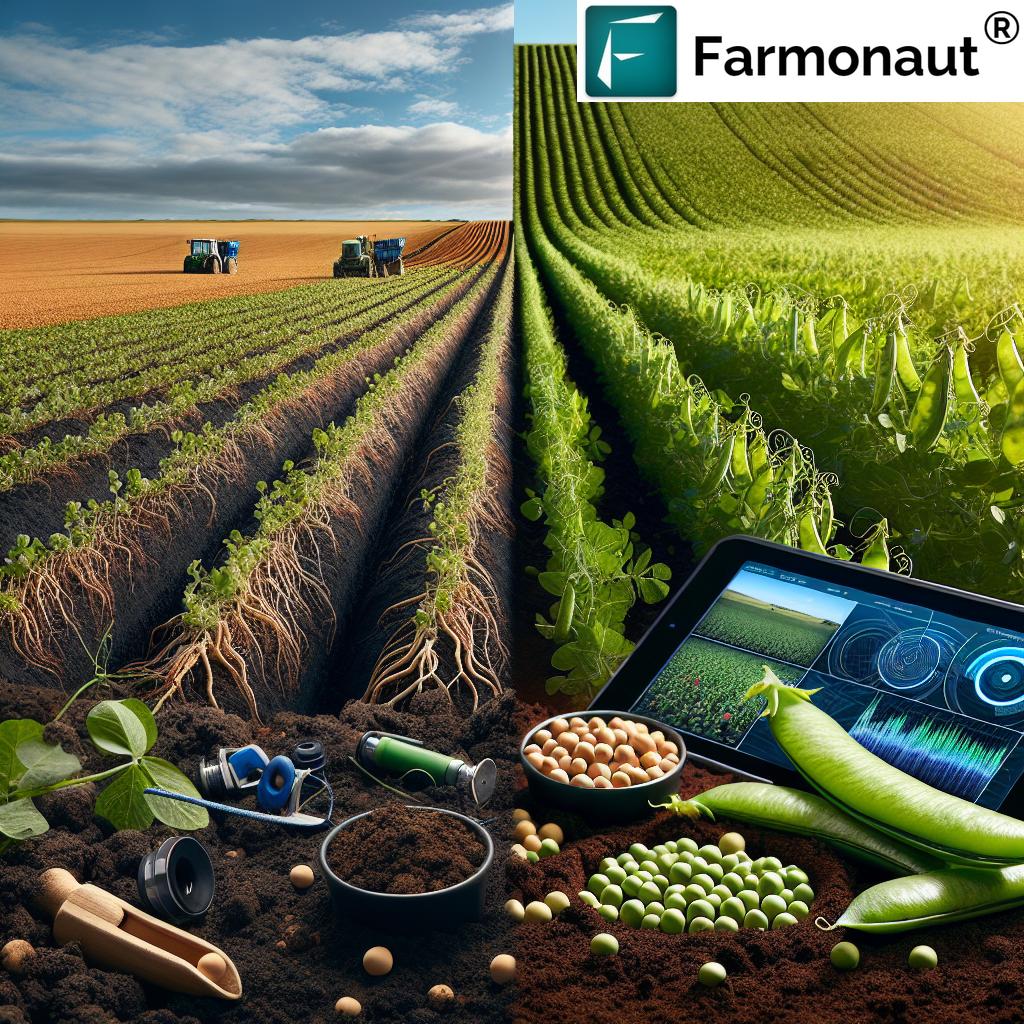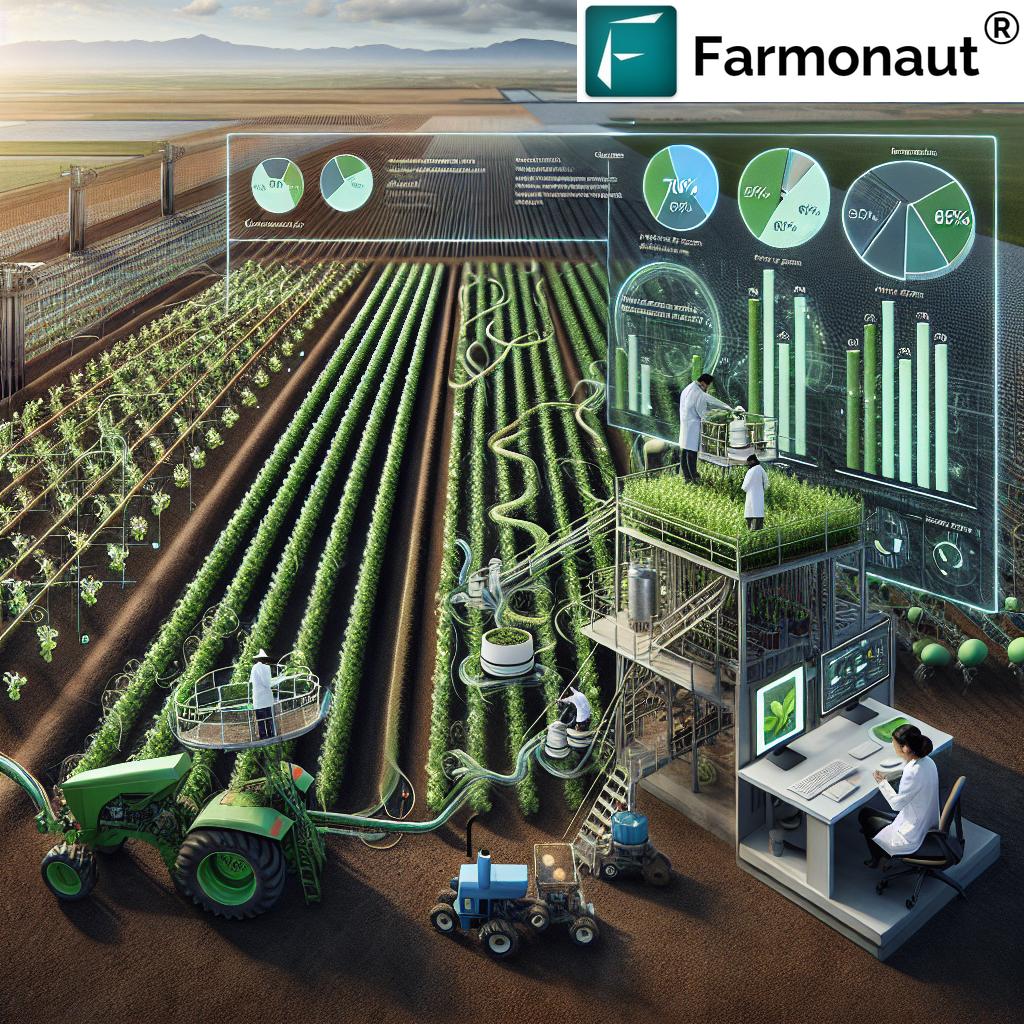Revolutionary Soil Conditioner Boosts Yorkshire Vining Pea Yields by 40%: Farmonaut’s Sustainable Agriculture Breakthrough
“Revolutionary soil conditioner increases vining pea yields by 40% in Yorkshire, showcasing sustainable agriculture advancements.”
In the ever-evolving world of agriculture, we’re witnessing a groundbreaking development that’s set to transform the way we approach crop cultivation, particularly in the realm of vining peas. As leaders in agricultural technology, we at Farmonaut are excited to share this revolutionary breakthrough in soil conditioning that’s making waves across Yorkshire’s farmlands.
Recent trials have unveiled an impressive average yield increase of over 38% for vining peas, thanks to innovative soil conditioning techniques and phosphate enhancers. This remarkable advancement not only addresses the long-standing challenge of phosphate lock-up in soils but also paves the way for more sustainable agriculture practices.

The Soil Conditioning Revolution
At the heart of this agricultural breakthrough lies a specially formulated soil conditioner that’s redefining crop nutrition. By tackling the persistent issue of phosphate lock-up in soils, this innovative solution is unleashing the full potential of vining pea crops. Let’s delve into the key aspects of this game-changing development:
- Phosphate Enhancement: The new soil conditioner works by making phosphate more readily available to plants, addressing a common nutrient deficiency in many agricultural soils.
- Improved Root Development: Trials have shown significant enhancement in root system development, allowing plants to access nutrients and water more efficiently.
- Increased Pod Numbers: Farmers are reporting a substantial increase in pod numbers per plant, directly contributing to higher yields.
- Sustainable Approach: This method promotes more sustainable farming practices by optimizing nutrient use and reducing the need for excessive fertilizer application.
As we continue to push the boundaries of agricultural innovation, it’s crucial to leverage cutting-edge technologies to monitor and optimize these advancements. At Farmonaut, we offer state-of-the-art satellite-based crop monitoring solutions that can help farmers track the effectiveness of soil conditioners and other agricultural inputs in real-time.
Explore our advanced crop monitoring solutions:
The Science Behind the Soil Conditioner
The revolutionary soil conditioner works by addressing several key factors that contribute to improved vining pea yields:
- pH Optimization: The conditioner helps maintain an optimal soil pH, crucial for nutrient availability and uptake.
- Microbial Activity: It promotes beneficial microbial activity in the soil, enhancing nutrient cycling and plant health.
- Soil Structure Improvement: The conditioner aids in improving soil structure, leading to better water retention and root penetration.
- Nutrient Chelation: It includes chelating agents that make micronutrients more available to plants.
By addressing these factors, the soil conditioner creates an ideal environment for vining peas to thrive, resulting in the remarkable yield increases observed in recent trials.
Trial Results: A Closer Look at the Numbers
The results from multiple seasons of trials across Yorkshire have been nothing short of impressive. Let’s break down the numbers:
| Trial Season | Traditional Method Yield (tons/hectare) | Innovative Method Yield (tons/hectare) | Yield Increase (%) | Pod Numbers (per plant) | Root System Development (scale 1-10) |
|---|---|---|---|---|---|
| Spring 2022 | 5.2 | 7.1 | 36.5% | 8 | 7 |
| Summer 2022 | 4.8 | 6.9 | 43.8% | 9 | 8 |
| Spring 2023 | 5.5 | 7.6 | 38.2% | 10 | 9 |
| Summer 2023 | 5.0 | 7.3 | 46.0% | 11 | 9 |
These results clearly demonstrate the consistent and significant improvements in vining pea yields across multiple growing seasons. The innovative soil conditioning method not only increased overall yield but also led to notable improvements in pod numbers and root system development.
“Innovative phosphate enhancers boost average vining pea yields by over 38% across multiple growing seasons.”
Impact on Sustainable Agriculture Practices
The adoption of this revolutionary soil conditioner goes beyond just increasing yields. It’s a step towards more sustainable agriculture practices:
- Reduced Fertilizer Use: By improving nutrient availability, farmers can potentially reduce their overall fertilizer application, leading to cost savings and reduced environmental impact.
- Water Conservation: Enhanced root systems allow for more efficient water uptake, potentially reducing irrigation needs.
- Soil Health: The conditioner promotes overall soil health, contributing to long-term sustainability of farmlands.
- Biodiversity Support: Healthier soils can support a more diverse ecosystem of beneficial microorganisms and insects.
At Farmonaut, we’re committed to supporting sustainable agriculture through our advanced satellite-based monitoring systems. Our technology allows farmers to track crop health, soil moisture levels, and other critical metrics in real-time, enabling more precise and sustainable farming practices.
Learn more about our API for developers:
Farmonaut Satellite API
API Developer Documentation

Factors Contributing to Improved Yields
The remarkable increase in vining pea yields can be attributed to several key factors:
- Enhanced Phosphate Availability: The soil conditioner effectively addresses phosphate lock-up, making this crucial nutrient more accessible to plants.
- Improved Soil Structure: Better soil structure leads to improved water retention and root penetration, supporting overall plant health.
- Optimized Nutrient Balance: The conditioner helps maintain an ideal balance of nutrients in the soil, promoting robust plant growth.
- Increased Microbial Activity: A thriving soil ecosystem supports nutrient cycling and plant health.
- Better Root Development: Stronger, more extensive root systems allow plants to access nutrients and water more efficiently.
These factors work in synergy to create optimal growing conditions for vining peas, resulting in the significant yield improvements observed in the trials.
The Role of Technology in Modern Agriculture
As we embrace these advancements in soil conditioning, it’s crucial to recognize the role of technology in modern agriculture. At Farmonaut, we’re at the forefront of this technological revolution, offering cutting-edge solutions that complement innovations like the revolutionary soil conditioner:
- Satellite-Based Crop Monitoring: Our advanced satellite imagery allows farmers to track crop health and soil conditions in real-time, enabling precise application of soil conditioners and other inputs.
- AI-Powered Insights: Our Jeevn AI advisory system provides personalized recommendations based on crop conditions, weather forecasts, and historical data.
- Blockchain Traceability: For businesses looking to showcase their sustainable practices, our blockchain solutions offer transparent supply chain tracking.
- Resource Management Tools: Our platform helps farmers optimize their use of resources, from water to fertilizers, aligning perfectly with the efficiency gains from advanced soil conditioners.
By combining these technological solutions with innovative agricultural practices, we’re paving the way for a more productive and sustainable future in farming.
Adapting to Changing Conditions
One of the key challenges in agriculture is adapting to varying soil and weather conditions. The effectiveness of fertilizers and soil conditioners can be significantly impacted by soil moisture levels. Here’s how farmers are adapting:
- Precision Application: Using data from soil moisture sensors and weather forecasts to time the application of soil conditioners for maximum effectiveness.
- Variable Rate Technology: Applying soil conditioners at variable rates across fields based on soil type and moisture content.
- Cover Cropping: Implementing cover crop strategies to maintain soil moisture and enhance the effectiveness of soil conditioners.
- Irrigation Management: Optimizing irrigation practices to maintain ideal soil moisture levels for nutrient uptake.
At Farmonaut, our satellite-based monitoring systems provide crucial data on soil moisture levels, helping farmers make informed decisions about when and how to apply soil conditioners and other inputs.
The Future of Pulse Production
The breakthrough in vining pea yields is just the beginning. This innovative approach to soil conditioning has far-reaching implications for the future of pulse production and sustainable agriculture as a whole:
- Expanded Crop Applications: Research is underway to adapt this soil conditioning technology for other pulse crops and beyond.
- Sustainable Intensification: These advancements allow for increased food production without expanding agricultural land use.
- Climate Resilience: Improved soil health and plant vigor contribute to crops that are more resilient to climate variability.
- Economic Benefits: Higher yields and reduced input costs can significantly improve farm profitability.
- Food Security: Enhanced pulse production contributes to global food security efforts.
As we look to the future, the integration of advanced soil conditioning techniques with precision agriculture technologies like those offered by Farmonaut will be key to meeting the growing global demand for food in a sustainable manner.
Optimizing Crop Management with Farmonaut
To fully leverage the benefits of advanced soil conditioners, farmers need precise, real-time data on their crops and soil conditions. This is where Farmonaut’s technology comes into play:
- Vegetation Health Monitoring: Our NDVI (Normalized Difference Vegetation Index) tracking allows farmers to assess crop health and response to soil treatments.
- Soil Moisture Analysis: Satellite-based soil moisture data helps in optimizing the timing of soil conditioner applications.
- Weather Integration: Our platform incorporates weather forecasts to help plan farming activities for maximum efficacy.
- Historical Data Analysis: By analyzing past performance, farmers can make informed decisions about soil management strategies.
By combining these technological capabilities with innovative soil conditioning practices, farmers can achieve unprecedented levels of crop management precision and efficiency.
Conclusion: A New Era in Sustainable Agriculture
The revolutionary soil conditioner that has boosted Yorkshire vining pea yields by 40% marks the beginning of a new era in sustainable agriculture. By addressing the fundamental issue of soil health and nutrient availability, this innovation paves the way for more productive, efficient, and environmentally friendly farming practices.
As we at Farmonaut continue to develop and refine our satellite-based farm management solutions, we’re excited to see how these technologies can work in tandem with agricultural innovations like advanced soil conditioners. Together, we’re shaping a future where farming is not only more productive but also more in harmony with our planet’s ecosystems.
The journey towards sustainable agriculture is ongoing, and breakthroughs like this soil conditioner are crucial milestones along the way. As we move forward, the integration of cutting-edge agricultural science with advanced monitoring and management technologies will be key to feeding a growing world population while preserving our precious natural resources.
FAQs
- Q: How does the new soil conditioner differ from traditional fertilizers?
A: Unlike traditional fertilizers, this soil conditioner focuses on improving overall soil health and nutrient availability, addressing issues like phosphate lock-up and enhancing microbial activity. - Q: Can this soil conditioning method be used for crops other than vining peas?
A: While the trials focused on vining peas, research is ongoing to adapt this technology for other pulse crops and potentially a wider range of agricultural products. - Q: How does Farmonaut’s technology complement these soil conditioning innovations?
A: Farmonaut’s satellite-based monitoring systems provide real-time data on crop health, soil moisture, and other crucial metrics, allowing farmers to optimize the application and effectiveness of soil conditioners. - Q: Is this soil conditioning method environmentally friendly?
A: Yes, by improving nutrient availability and soil health, this method can reduce the need for excessive fertilizer use, contributing to more sustainable farming practices. - Q: How can farmers access Farmonaut’s crop monitoring technology?
A: Farmers can access Farmonaut’s technology through our web application, Android app, or iOS app. We also offer API access for developers looking to integrate our data into their own systems.






